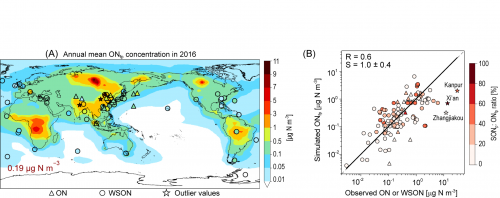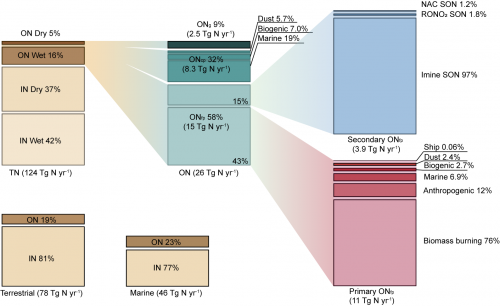Difference between revisions of "Papers:Li et al 2023"
From atmoschem
Atomoschem (Talk | contribs) (Created page with " '''Abstract |''' Atmospheric deposition of particulate organic nitrogen (ONp) is a significant process in the global nitrogen cycle and may be pivotally important for N-limi...") |
Atomoschem (Talk | contribs) |
||
| (2 intermediate revisions by the same user not shown) | |||
| Line 1: | Line 1: | ||
| − | + | [[Image:Li_et_al_2023.png|center|500px|Li et al 2023]] | |
| + | [[Image:Li_et_al_2023_2.png|center|500px|Li et al 2023]] | ||
'''Abstract |''' Atmospheric deposition of particulate organic nitrogen (ONp) is a significant process in the global nitrogen cycle and may be pivotally important for N-limited ecosystems. However, past models largely overlooked the spatial and chemical inhomogeneity of atmospheric ONp and were thus deficient in assessing global ONp impacts. We constructed a comprehensive global model of atmospheric gaseous and particulate organic nitrogen (ON), including latest knowledge on emissions and secondary formations. Using this model, we simulated global atmospheric ONp abundances consistent with observations. Our estimated global atmospheric ON deposition was 26 Tg N yr^−1, predominantly in the form of ONp (23 Tg N yr^−1) and mostly from wildfires (37%), oceans (22%), and aqueous productions (17%). Globally, ONp contributed as high as 40% to 80% of the total N deposition downwind of biomass burning regions. Atmospheric ONp deposition thus constituted the dominant external N supply to the N-limited boreal forests, tundras, and the Arctic Ocean, and its importance may amplify in a future warming climate. | '''Abstract |''' Atmospheric deposition of particulate organic nitrogen (ONp) is a significant process in the global nitrogen cycle and may be pivotally important for N-limited ecosystems. However, past models largely overlooked the spatial and chemical inhomogeneity of atmospheric ONp and were thus deficient in assessing global ONp impacts. We constructed a comprehensive global model of atmospheric gaseous and particulate organic nitrogen (ON), including latest knowledge on emissions and secondary formations. Using this model, we simulated global atmospheric ONp abundances consistent with observations. Our estimated global atmospheric ON deposition was 26 Tg N yr^−1, predominantly in the form of ONp (23 Tg N yr^−1) and mostly from wildfires (37%), oceans (22%), and aqueous productions (17%). Globally, ONp contributed as high as 40% to 80% of the total N deposition downwind of biomass burning regions. Atmospheric ONp deposition thus constituted the dominant external N supply to the N-limited boreal forests, tundras, and the Arctic Ocean, and its importance may amplify in a future warming climate. | ||
| − | '''Publication |''' '''Li, Y.''', '''Fu, T.-M.*''', Yu, J. Z.*, Yu, X., Chen, Q., Miao, R., Zhou, Y., '''Zhang, A.''', Ye, J., Yang, X., Tao, S., Liu, H., Yao, W. (2023), Dissecting the contributions of organic nitrogen aerosols to global atmospheric nitrogen deposition and implications for ecosystems, ''National Science Review'', nwad244, doi:10.1093/nsr/nwad244. | + | |
| + | '''Publication |''' '''Li, Y.''', '''Fu, T.-M.*''', Yu, J. Z.*, Yu, X., Chen, Q., Miao, R., Zhou, Y., '''Zhang, A.''', Ye, J., Yang, X., Tao, S., Liu, H., Yao, W. (2023), Dissecting the contributions of organic nitrogen aerosols to global atmospheric nitrogen deposition and implications for ecosystems, ''National Science Review'', nwad244, doi:10.1093/nsr/nwad244. [https://atmoschem.org.cn/papers/2Li_et_al_2023_National_Science_Review_Dissecting.pdf PDF] [https://doi.org/10.1093/nsr/nwad244 Full text] | ||
Latest revision as of 14:24, 30 October 2023
Abstract | Atmospheric deposition of particulate organic nitrogen (ONp) is a significant process in the global nitrogen cycle and may be pivotally important for N-limited ecosystems. However, past models largely overlooked the spatial and chemical inhomogeneity of atmospheric ONp and were thus deficient in assessing global ONp impacts. We constructed a comprehensive global model of atmospheric gaseous and particulate organic nitrogen (ON), including latest knowledge on emissions and secondary formations. Using this model, we simulated global atmospheric ONp abundances consistent with observations. Our estimated global atmospheric ON deposition was 26 Tg N yr^−1, predominantly in the form of ONp (23 Tg N yr^−1) and mostly from wildfires (37%), oceans (22%), and aqueous productions (17%). Globally, ONp contributed as high as 40% to 80% of the total N deposition downwind of biomass burning regions. Atmospheric ONp deposition thus constituted the dominant external N supply to the N-limited boreal forests, tundras, and the Arctic Ocean, and its importance may amplify in a future warming climate.
Publication | Li, Y., Fu, T.-M.*, Yu, J. Z.*, Yu, X., Chen, Q., Miao, R., Zhou, Y., Zhang, A., Ye, J., Yang, X., Tao, S., Liu, H., Yao, W. (2023), Dissecting the contributions of organic nitrogen aerosols to global atmospheric nitrogen deposition and implications for ecosystems, National Science Review, nwad244, doi:10.1093/nsr/nwad244. PDF Full text
- This page was last modified on 30 October 2023, at 14:24.
- This page has been accessed 1,853 times.

